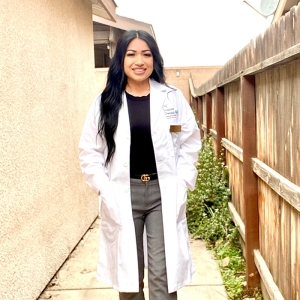MSN graduate seeks to improve rural access to health care
May 16, 2023 / by Jacqueline Mazarella- Alumni
According to the National Institutes of Health, rural Americans are more likely to die prematurely from heart disease, cancer, lung disease and stroke, and have higher rates of obesity and diabetes. They are also at greater risk for fatal car crashes, suicide and drug overdoses. Raelene Zamora wants to change this for her community of Porterville, California, and receives her Master of Science in Nursing (MSN) from the USC Suzanne Dworak-Peck School of Social Work in May 2023.
For Zamora, who grew up in the small Central Valley town, medical care in her community has always been daunting. It was normal for her to wait all day to be seen at a local clinic, and there was a period of months when she drove 55 miles for her daughter to see a specialist. Many residents of Porterville are living under the poverty line, so having to travel long distances for medical treatment is unrealistic.
“The commute could set some families back in their rent, work, food and day-to-day expenses,” Zamora said. “Especially if they are missing work to make the appointment.”
Zamora’s path to earning her MSN and becoming a family nurse practitioner has been challenging. She dropped out of high school, and unexpectedly became pregnant when she was 19. It was then she decided to go back and get her high school diploma. For the next 13 years, Zamora raised her daughter alone, earned her associate’s degree in nursing, and after passing her boards, began work at the local hospital, first as a preoperative nurse and now in the Intensive Care Unit (ICU).
At the hospital, Zamora cares for seriously ill patients. It was her experience there, coupled with those of her family living in the community, that inspired her to pursue an advanced degree in nursing.
Janett Hildebrand, associate teaching professor in the Department of Nursing at USC Social Work, explains that in rural communities like Zamora’s, social determinants of health play a significant role in health disparities and inequities. Obstacles like lack of transportation, literacy skills, access to a primary care provider during non-working hours and the necessity to travel long distances for care are common.
“These circumstances lead to delay in care, thus, patients may be sicker when they seek medical care,” Hildebrand said.
Zamora watched, helplessly, as a close aunt passed away from an end-stage cancer. “It could have been caught sooner, but the local clinic doctors kept turning her away,” she said. “I want to be able to recognize something like that and maybe take it a little more seriously in terms of thinking outside the box for any patient, no matter if they’re young or old, to look at all the possibilities it could be.”
She followed her heart
Zamora enrolled at USC and was able to take advantage of the flexible hybrid model of the MSN program while continuing to work at the ICU in Porterville. Classes are online, but live, allowing for interaction with professors and classmates in real-time. The small class sizes allowed the students to really get to know each other and Zamora says they still keep in touch. And as a self-proclaimed lover of learning, she appreciated the challenging and fulfilling local clinical placements for her required internships.
Hildebrand explains that these clinical experiences prepared Zamora to integrate the social determinants of health domains into her practice to provide high-quality comprehensive care to people with acute and chronic diseases.
“When she spoke in class, there was an excitement in her voice about her future role as a practitioner,” Hildebrand said. “She was aware of the disparities as an inpatient nurse, but now she was able to see how her role as a nurse practitioner could make a difference in the lives of patients such as the prevention of hospitalization. Her enthusiasm was reflected in her storytelling of the patient cases.”
As health care in rural areas across the country suffer from a shortage of doctors, particularly specialists, there is limited access to state-of-the-art equipment and an increasing number of health system closures due to lack of funding, Zamora wants to help make access to health care a priority in Porterville. It is where she grew up, her family is there and she sees the greater community as her extended family. She wants them all to have the same access to medical care as those in bigger cities, which would provide better patient outcomes by cutting out delays in patient care.
“I see my MSN providing me with the opportunity to sit down and thoroughly educate my patients,” Zamora said. “This is the main reason I chose to pursue my MSN to become a family nurse practitioner, to be able to have the opportunity to prevent someone from ending up in the ICU. To educate, follow-up and be someone the patient can see as a trusted provider, not just another provider.”
To reference the work of our faculty online, we ask that you directly quote their work where possible and attribute it to "FACULTY NAME, a professor in the USC Suzanne Dworak-Peck School of Social Work” (LINK: https://dworakpeck.usc.edu)
